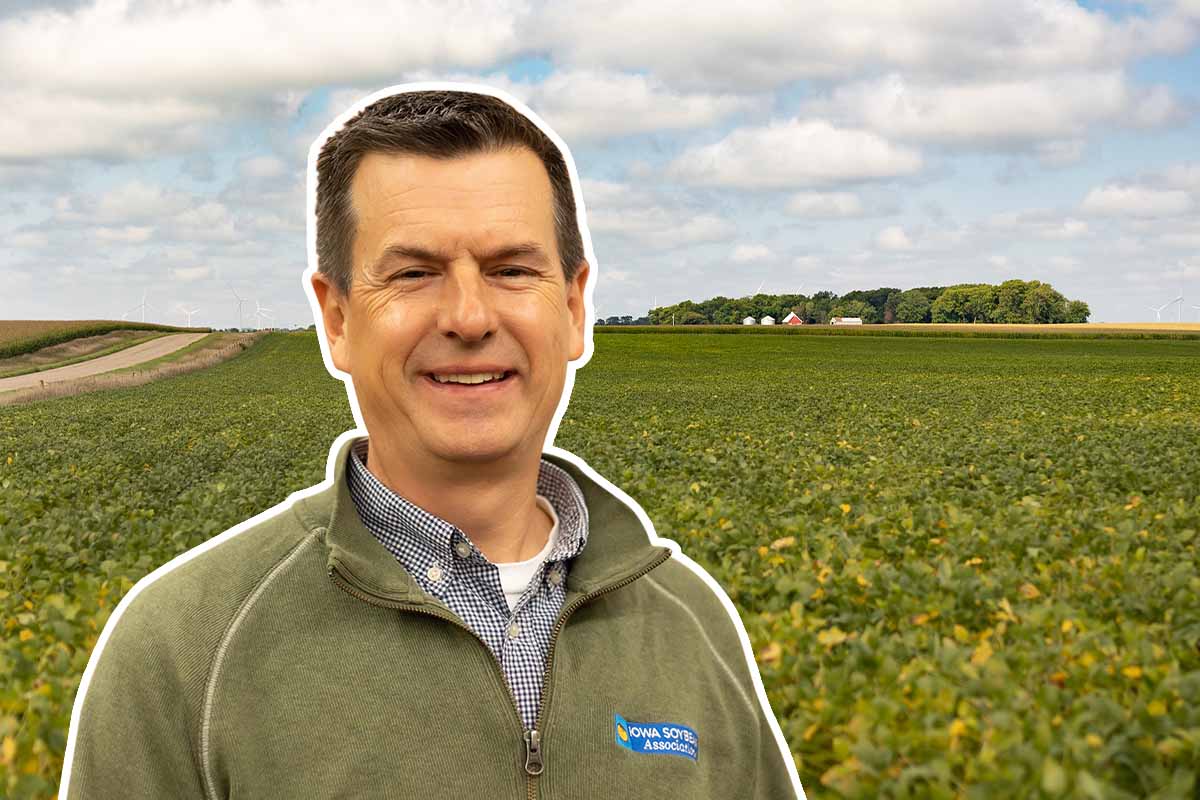
(Photo: Joclyn Bushman/Iowa Soybean Association)
Leveraging checkoff investments for real results
February 7, 2023
RCFI is the standard-bearer for research and helping farmers become more productive
The Iowa Soybean Association’s (ISA) Research Center for Farming Innovation (RCFI) continues to find ways to help soybean farmers be productive, profitable and sustainable.
They’re able to achieve these goals by leveraging soybean checkoff dollars and finding additional funding and partnership resources that help farmers with innovative research, tools and technical support.
Resources and relationships
For every $1 of checkoff revenue received from Iowa soybean farmers, 13 cents are allocated to research. About half of that (6 cents) goes to support the work of the RCFI team. Todd Sutphin, RCFI senior research program manager, says the center leverages non-checkoff funding resources at levels as high as two times the amount.
“We utilize the checkoff to secure additional funding, which involves state, federal and private grants,” he says. Having checkoff dollars allows RCFI to obtain grants that have matching requirements. For example for every $1 in checkoff funds, RCFI often receives $2. Sutphin compared leveraging checkoff dollars to diversifying one’s stock portfolio.
Beyond the money, however, it allows RCFI to build partnerships. “We have great partners and can do more as a team than ISA alone,” Sutphin says.
“With these partnerships, we’re not just going after funding. The programs must be mutually aligned for our farmer members’ profitability, production and sustainability goals.”
Growing list of projects
Sutphin says RCFI’s efforts have grown over the years.
“In the early days of our on-farm research, we were doing research others were not doing,” he says.
“But today, more entities are doing that same work. The space is more competitive to go after ag research dollars.”
Sutphin says RCFI continues its work by doing a variety of research, including:
- Studying cover crops for improved soil health and water quality;
- Developing online agronomic decision-making applications;
- Reducing costs and improving management efforts through data-driven simulation tools;
- Planning watersheds and highlighting its long-term value;
- Researching drainage water recycling;
- Studying pest management solutions; and
- Adapting and building resilience in nitrogen fertilizer management.
Future efforts
So, what does the next 5-10 years look like for RCFI?
Bigger projects and greater engagement with farmers in the state. “Bigger projects have value and bring on more trials statewide that answer farmers’ questions," Sutphin says.
“As we evolve into the conservation agronomist area, there is real potential to grow. In the last five years, we’ve seen the value of ag retailers to both field agronomists and conservation agronomists.”
While many farmers are using practices that are directionally correct, RCFI has data that can be validated on the farm. This offers informative feedback on those practices to help farmers improve.
ISA District 1 Director and Farmer-member Chuck White from Clay County agrees.
“RCFI really shines,” he says. “They get farmers to participate and have the data they need.
“Every year, I look for new ways to test products. RCFI gives me an idea if these practices will work on my farm or how the data or practice might contribute to the entire state. RCFI has the staff to get these projects implemented, and they have the analytics.”
White says RCFI trials are thorough.
“You have to have multiyear trials,” he says. “The nice thing about RCFI is that they provide more than just one year of data.
“While it means research outcomes might not be immediately available, the outcome and information provided to farmers proves RCFI’s efforts are time well spent, White says. "RCFI lets us know if something is a good investment.”
Farmer supported
“When I came to ISA 20 years ago, we had a lot of ideas of things we wanted to implement, all in the name of farmers improving their bottom line and stewardship practices,” says Sutphin.
“We’ve put those plans into action and have seen farmers become profitable, along with improving water quality and soil health.”
Those efforts have been recognized by White and others.
“I’m proud that ISA has become a respected party in the discussion around conservation and agronomy,” Sutphin says. “When you think about where to go for information, ISA has become a trusted resource for data information and unbiased research. RCFI has the platform to do unbiased research.”
With an average of 60 to 80 projects under way each year, those ISA projects highlight the importance of leveraging checkoff dollars into tangible results.
“We’ve gone after non-checkoff funding on behalf of farmers to do more for Iowa farmers,” says Sutphin. “It’s a big deal to have those leveraged dollars to go above and beyond the checkoff.”
For more information on RCFI, go here.
Back